by Yolanda Goode | Mar 15, 2019

Are you physically or mentally running on E?
Are you racing “90 to nothing” in your daily life? until something forces us to hit the brakes or the emergency brake is applied. Instead of clearing our plates, we add sideboards onto them so that we can accept more.
We wear many hats outside of work such as a family member, caregiver, volunteer, student, etc. Some days we find ourselves in foul moods where we lack comprehension, patience, and focus. Is it because we are hangry (hungry + angry) or just plain ole tired? You’ve heard the saying; “you can’t squeeze blood from a turnip”… or is that a beet?…LoL, you get the point. How do we avoid the breakdown that can and will happen if we keep pushing ourselves without intentional refueling?
Here are several tips to help you stay fueled and refreshed:
- Block scheduling: I shared a photo of a tool that I use, but you use what works for you. The key thing is for you to understand where you can capture time for yourself to refuel.
- Rest: Sleep on a regular schedule and take breaks during the day.
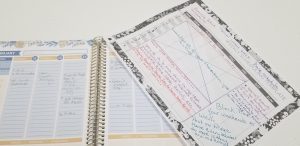
- Eat well: physically, mentally, emotionally, and spiritually.
- Have some fun: You are encouraged to have fun. Adulting is tough.
- Take lunch: Go visit a local library, museum, or sit in your car at a local park.
- Vacation: Plan for it, and take it. But leave some recovery time, so you are not rushing back to work the next day. Another option is weekend trips or a day-cations while kid(s) are at school.
- Nurture your hobbies: When was the last time you ____________?
- Guard your time: Once you’ve blocked it out, it’s yours. Don’t let others guilt you into giving it back.
Slowly implement some of these tips into your life, and remember an empty tank is just that. Empty. You will be more productive by taking care of you, and you’ll be better able to wear all those hats.
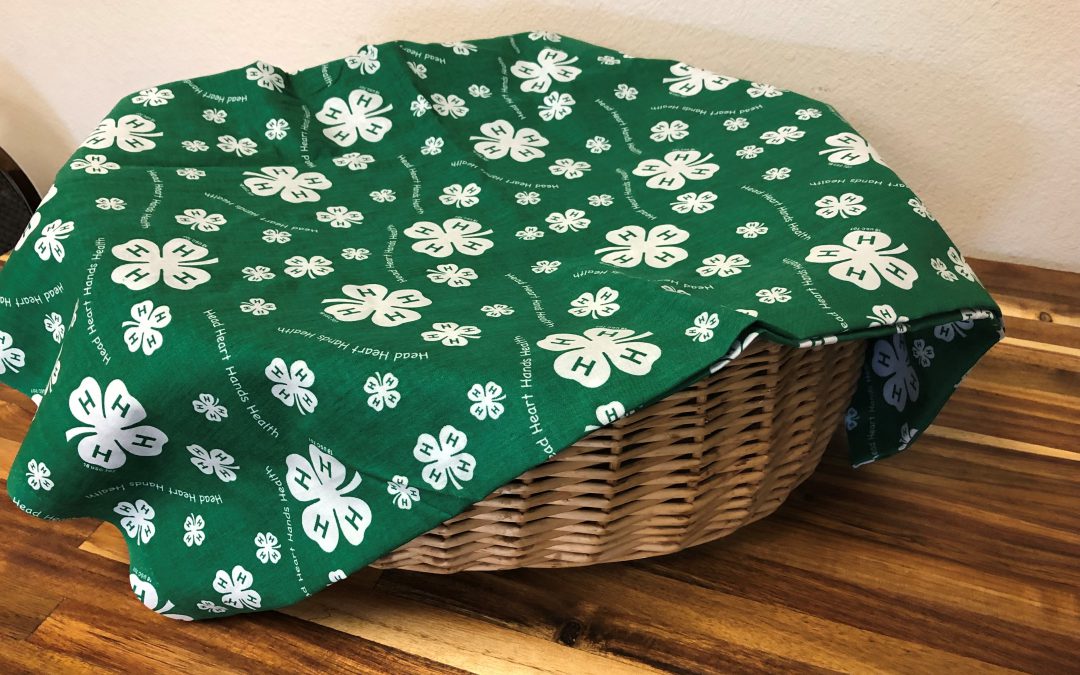
by Marie Arick | Mar 11, 2019
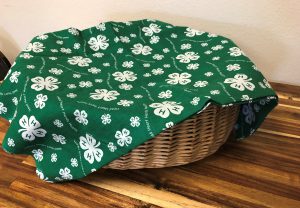
4-H Food Challenge Mystery Basket
Being creative in the kitchen…using a surprise set of ingredients…making a tasty dish…frequent watcher of The Food Network? Then the 4-H Food Challenge camp is the summer day camp for you!
Take a Sneak Peek
Here’s a sample list of possible ingredients in the Fruit & Vegetable category:
- 4 medium potatoes
- 1 cup carrots, sliced
- 1 cup of celery, sliced
- 1 ½ cups green bell pepper strips
- 1/3 cup onions, sliced
- 1 clove garlic, minced
- 1 tomato, cut into wedges
- 3 tablespoons of canola oil, divided
- ½ cup of water
- 2 tablespoons of low sodium soy sauce
- 1 ½ teaspoons of cornstarch
Any idea what you’d prepare? What would you name your dish?
Participants in the 4-H Food Challenge camp will work in teams with 3 to 4 members. Teams will be presented with:
- a food category
- a set of mystery ingredients
- 40 minutes to create a dish, prepare a presentation about their dish, and clean their work area
When time is up, teams will present their creation to a panel of judges describing their collaboration in creating the dish, food safety practices used by the team, how they worked together, and finally, a description of the dish including some nutrition information.
We all eat, so food safety and preparation are skills that we all need. 4-H Food Challenge campers will learn those skills along with nutrition knowledge, teamwork and presentation skills. Look for this day camp opportunity in your local UF/IFAS Extension 4-H program this summer, and join us in putting our skills to the test!
*The 4-H Food Challenge is loosely based on The Food Network show “Chopped” and adapted from the Texas 4-H Food Challenge Contest.
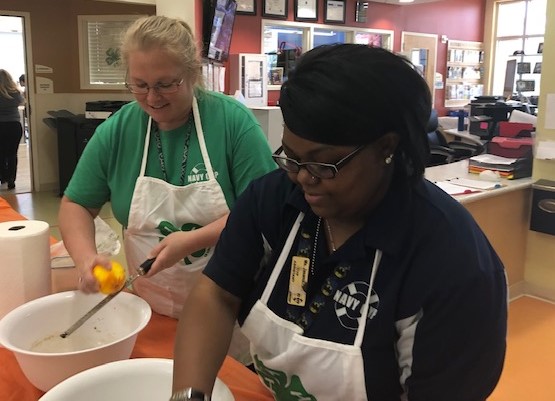
by pmdavis | Feb 14, 2019
Making lotions and bath scrubs, practicing relaxation and doing yoga…doesn’t this sound like a great 4-H club program? Discover 4-H Spa and Relaxation Clubs are a great way to learn about homemade body products while learning relaxation techniques. Youth create a day at the spa by making lotions, soaps, scrubs and lip balms while learning methods to relax like tennis ball massages, creating a happy list, doing yoga and creating a zen garden. An added bonus is homemade products are a fraction of the cost of purchasing and make great gifts for friends and family.
Make your own Luxurious Bath Salts
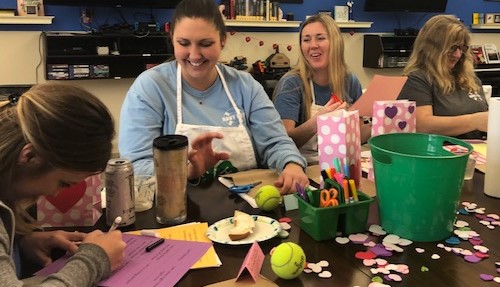
Naval Support Activity-Panama City staff learning how to making calm bags.
- ½ cup baking soda
- ½ cup powdered milk
- 1 cup sea salt
- 1 cup Epsom salt ( scented or plain)
- Use 3-5 drops fragrance oil designed for soaps or diluted essential oil for plain Epsom salt
- Mix ingredients
- Spoon the mixture into storage containers (wide mouth jars, bowls or zip style bags work well)
- Label your container with ingredients and direction for use – Pinterest has several cute label designs
Caution: Essential oils are very strong and can be a skin irritant if applied directly to your skin. National Association for Holistic Aromatherapy recommends diluting essential oils with a carrier oil: use 1 teaspoon of coconut, almond, olive, sunflower or jojoba oil with 2 – 12 drops of the desired essential oil. Then, mix 3-5 drops of the diluted oil to your bath salt mixture. Bath salts are generally safe for most when used properly, but you should talk to your doctor before using bath salts if you have medical conditions such as skin diseases, heart disease or diabetes.
How to Use Your Bath Salts: Fill your tub halfway with warm to hot water, and pour in about 1/2 cup (120 g) of bath salts. For a stronger concentration, you can always add more. If you prefer showers, take a handful and rub over desired area. Bath salts are great to exfoliate by removing dead skin cells leaving the skin smooth and fresh. Tired achy feet or hands? No problem! Add salts to warm water in a dishpan, and immerse your feet or hands and soak away the pain.

NSA-PC staff learning the 4-H Spa & Relaxation Curricula they will use in their 4-H programs.
For more information on 4-H and other programs like this, contact your local UF/IFAS County Extension Office, or visit Florida 4-H.
Are you an adult looking for ways to coach, teach and mentor youth? Contact the 4-H Agent in your county and enroll as a volunteer in 4-H Online. Volunteering not only strengthens the 4-H club, but also shows young people how to live with integrity, optimism, hope, determination, compassion, responsibility and resiliency – skills that will help them succeed in life.
Resource:
Discover 4-H Spa and Relaxation Clubs curriculum
by Prudence Caskey | Jan 22, 2019
Imagine this…an appointment runs long, you skip lunch and end up snacking the rest of the day. That leads to eating dinner very late and you feeling like your whole diet and commitment to eating better in 2019 is blown! Don’t toss in the towel and give up; each new morning brings a new day and a fresh start and a chance to start over.
One of the most important skills youth learn and practice in 4-H is goal setting behavior. Here are some ways to help make goals more achievable for you and the youth in your life:
-
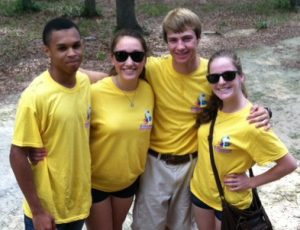
Youth are most motivated when they set their own goals.
Make goals S.M.A.R.T.
- Goals should be Specific, Measurable, Achievable, Realistic and Tangible
- Develop an Action Plan
- Write goals down
- Have an action plan to track progress
- Reflect along the way
- Make your goals present in your daily activities
- Put a reminder note on your mirror
- Set a reminder alarm on your phone
- Get an accountability partner
- Find someone you can trust to report your progress
- Check in an chat
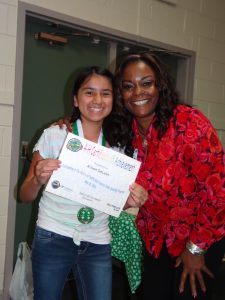
Nothing matches the look on a face when a goal is reached!
My son is my physical activity accountability partner, and he and I walk together. Sometimes he has to drag me out of the house, and sometimes I have to get him motivated to go – whatever it takes to meet your goals.
Remember, every day is new with the opportunity to start fresh each day. Make a New Day Resolution to achieve your goals. If you fell off the wagon yesterday, let it go. Best wishes for a great new year and for every new day you have!
For more information on 4-H in your county, contact your local UF/IFAS Extension office.
Resources: How Setting Goals Helps Teens Succeed
by Melanie Taylor | Jan 11, 2019

Be mindful and enjoy the moment.
Now that the busy holiday season is over, it’s a time to reflect on the past but prepare and refocus for the new year ahead. As we focus on the new year, it is always refreshing to have a clean slate. As the year begins to unfold, there are tips to help you manage your day-to-day stress levels. It begins with mindfulness.
What is mindfulness?
Mindfulness means paying attention in a particular way; on purpose, in the present moment, and non-judgmentally.” Dr. Jon Kabat-Zinn (1991)
Mindfulness is best thought of as a way of being rather than an activity Almost any activity can be carried out with mindful awareness.
Three Key Features of Mindful Awareness:
- Purpose – intentionally and purposefully directing your attention rather than letting it wander.
- Presence – being fully engaged with and attentive to the present moment. Thoughts about the past and future that arise are recognized simply as thoughts occurring in the present.
- Acceptance – being non-judgmental toward whatever arises in the moment. This means that sensations, thoughts, and emotions are not judged as good or bad, pleasant or unpleasant; they are simply noticed as “happening” and observed until they eventually pass (Naik, Harris and Forthun 2016).
Mindfulness is a mind-body practice that has been found to benefit both psychological and physical health. The primary psychological change that occurs during mindfulness practice is an increased awareness of thoughts, feelings, and sensations in the present moment. Over time, mindfulness practice can help you to become aware of the space between noticing experiences and reacting to them by letting you slow down and observe the processes of your mind (Black 2010).
The ultimate goal of mindfulness practice is for you to take advantage of this space so you can make more intentional decisions – to wake up from living life on autopilot, based on unproductive habits of mind
(Black 2010; Walach et al. 2007).
According to the American Psychological Association, some empirically supported benefits of mindfulness include the following (Davis & Hayes 2011):
Psychological Benefits
- Increased awareness of one’s mind
- Significantly reduced stress, anxiety, and negative emotions
- Increased control over ruminative thinking (a major cause and symptom of depression and anxiety)
- Increased mental flexibility and focus
- More working memory
- Decreased distracting thoughts
- Decreased emotional reactivity
- Increased capacity for intentional, responsive behaviors
- Increased empathy, compassion and conscientiousness of other’s emotions
Physiological Benefits
- Enhanced immune system functioning
- Increased brain density and neural integration in areas responsible for positive emotions, self-regulation, and long-term planning
- Lowered blood pressure
- Lowered levels of blood cortisol (a major stress hormone)
- Greater resistance to stress-related illnesses such as heart disease
Spiritual Benefits
- Increased self-insight and self-acceptance
- Increased acceptance of others
- Increased compassion and empathy
- Increased sense of morality, intuition, and courage to change
- Increased control over automatic behaviors
- Increased self-discipline
The question is, how many of us would like to benefit from mindfulness if it provides these positive benefits? All of us should strive to lower our stress level and enjoy our daily lives with a more positive attitude and more attentiveness. So, how can we incorporate this into our lives? The majority of this practice is about familiarizing yourself with what it feels like to be mindful, and getting better at “remembering” to maintain mindful awareness.
Experiment with creating your own mindfulness practices throughout your day. Being mindful of the sensation on the soles of your feet as you walk to your car or the taste and texture of your morning coffee can transform routine moments into deeply satisfying practices. However, having a ritualized and structured practice can be beneficial. To find out more about practicing mindfulness and how to incorporate a more structured practice in your life visit read Mindfulness: An Introduction.
Sources: Mindfulness: An Introduction. 2013, 2016. Retrieved from the UF/IFAS Extension Electronic Data Information System: https://edis.ifas.ufl.edu/fy1381. Publication #FCS2335
by Niki Crawson | Dec 21, 2018
Did you know lack of organization in your life can affect not only your physical surroundings but also your physical and mental well-being? Clutter affects your ability to think, to focus, and even to relax. For children, having an organized space for homework allows for productivity and creativity. For adults, having an organized work space allows for productivity and efficiency. Having an organized home for children sets schedules and routines. For adults, having set schedules and routines make it easier to balance work, family time, and responsibilities such as financial planning and grocery shopping.
To start 2019 off on a positive note, let’s take a look at some easy ways you can get better organized for a better you in 2019.
1. SET GOALS
Goal-setting is an important life skill 4-H focuses on through the essential element, Independence. 4-Hers are taught goal-setting – an important tool that helps them state how, what, and when they are going to achieve something. To get started organizing and decluttering your home:
- Set 2-3 short-term goals
- Set 1-2 long-term goals
- Write them down – make them visible
Anything more than this will be too overwhelming and cause you to not start at all.
2. MAKE LISTS
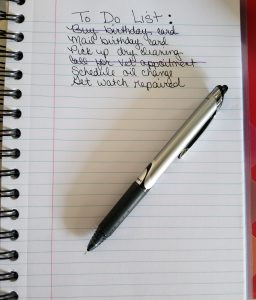
Making a handwritten detailed to do list is important in staying organized.
Written lists are very important in accomplishing tasks. Most importantly, hand-written lists are more powerful than typed lists. Why? Handwriting requires more thought and motor skills which requires more cognitive and memory function. By having written to do lists, your memory can conjure up the tasks quickly and prioritize them with little effort even when the list is not directly in front of you. This allows you to plan your schedule to work on the list throughout the day, when time permits. In addition, writing lists allow the satisfaction of achievement. When you accomplish a task, cross it off the list and feel the sense of accomplishment that comes with getting things done.
3. DIVIDE AND CONQUER
One of the worst things you can do when attempting to organize a cluttered home is to look at the disorganized mess as a whole. This can be overwhelming, defeating and make you give up before you even get started! Don’t do this…instead, divide and conquer!
- Start by dividing your home into sections.
- Choose one room to start with.
- Start with just one section of that room – like the top of the dresser.
- Organize just that one area. Donate or sell any items you do not want or use.
Once you have organized your first area in that room, congratulate yourself and move to the next area. Begin the process again!
CUT CLUTTER WITH A CLOSE FRIEND
If you think getting organized is complicated, invite an organized friend over, and ask them to help. Organized individuals will help you stay on track, discard what you don’t need, and help you find a place for those random items you don’t know where to put. Some people just have a natural ability for organization, but for others, it’s just plain work.
ELIMINATE DUPLICATES
I’ve moved several times in recent years.The last time I was unpacking (for what I hope is my last move), I discovered I have nine hammers. Nine hammers!!! Apparently, each time I moved, I couldn’t find my hammer, so I just bought one. Over time, that gets expensive and takes up space. As you begin to organize and declutter, eliminate duplicates. Think about what you need and begin to downsize. You’ll be amazed at what you truly need versus what you think you need.
SAY GOODBYE…
If you haven’t used it in the last six months but don’t want to get rid of it just yet, box it up and label it with the date. If three months goes by and you don’t miss it, donate or sell it. Yard sales, selling apps or social media are a great way to make some extra money , BUT don’t hang on to it until you “get around to it….” Donate it to charity, or you’ll end up back in the cluttered mess you started with!
Simply taking the time now to put these few actions into place will help create a more efficient, better balanced and stress-free environment in the home and workplace. I hope that you find yourself healthier and happier in 2019!
To find out more information about 4-H programs that can offer essential life skills such as independence, organizational skills, and goal setting, to your children or to volunteer your time to work with children in your area, please contact your local UF/IFAS County Extension Office, or visit http://florida4h.org.










